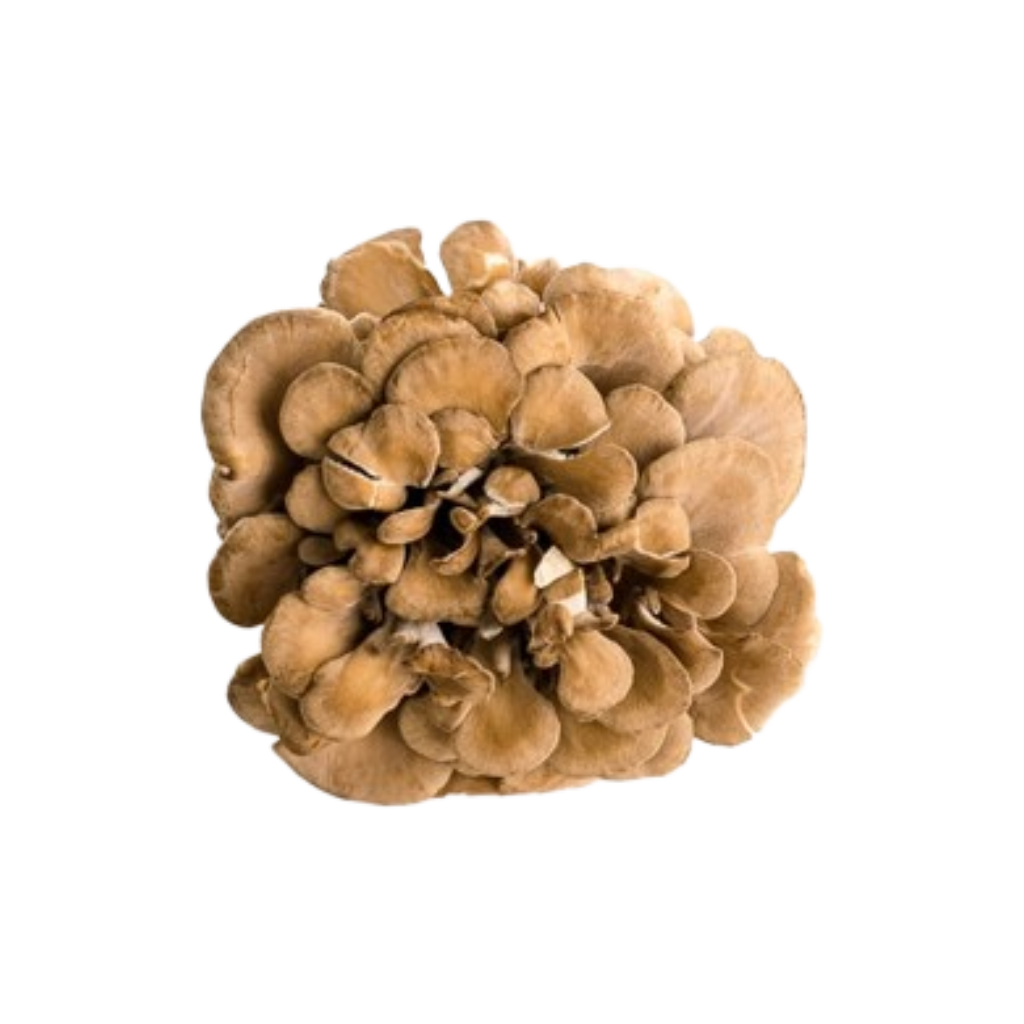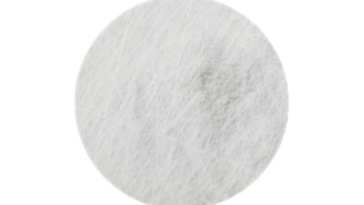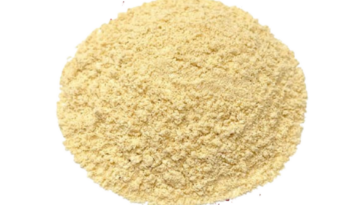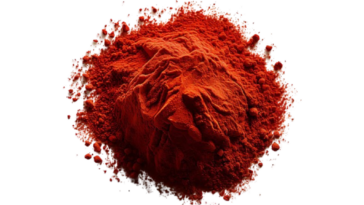Maitake mushroom (Grifola frondosa), commonly referred to as hen-of-the-woods or dancing mushroom, is a sought-after fungal species renowned for its culinary versatility and potential health benefits. This gourmet mushroom flourishes in the natural habitat of old-growth oaks or maples, where it forms large, frilly clusters at the base of trees. With its unique appearance and rich umami flavor, Maitake has garnered significant attention in the culinary world and is often prized by chefs and food enthusiasts alike.
From a nutritional perspective, Maitake mushrooms are low in calories and rich in essential nutrients such as vitamins, minerals, and dietary fiber. They are also valued for their potential health-promoting properties, including immune support and blood sugar regulation.
In addition to its culinary and nutritional attributes, Maitake mushrooms have gained traction in the realm of holistic health and wellness. They are frequently included in traditional herbal remedies and dietary supplements aimed at boosting immunity and overall vitality.
For those seeking to incorporate Maitake mushrooms into their diet or wellness routine, sourcing them from reputable suppliers is essential to ensure quality and authenticity. Whether enjoyed sautéed, roasted, or added to soups and stews, Maitake mushrooms offer a flavorful and nutritious addition to any culinary repertoire.
Vitamins & Minerals:
Maitake mushrooms, also known as “Hen of the Woods,” are indeed a treasure trove of essential vitamins and minerals, each playing a vital role in maintaining various bodily functions. Let’s explore the relationship between these nutrients and Maitake mushrooms:
- Vitamin B2 (Riboflavin): Found in Maitake mushrooms, riboflavin is crucial for energy production and various cellular processes. It supports healthy skin, eyes, and the nervous system.
- Vitamin B3 (Niacin): Niacin in Maitake mushrooms aids in converting food into energy and supports nerve function, skin health, and digestion.
- Vitamin B4 (Choline): Choline, present in Maitake mushrooms, is essential for liver function, brain development, and nervous system regulation.
- Vitamin B5 (Pantothenic Acid): Maitake mushrooms provide pantothenic acid, which is necessary for metabolizing nutrients into energy and synthesizing vital compounds like hormones and cholesterol.
- Vitamin B6 (Pyridoxine): Vitamin B6 in Maitake mushrooms is involved in numerous enzyme reactions, supporting protein metabolism, immune function, and brain health.
- Vitamin B9 (Folic Acid): Maitake mushrooms contain folic acid, crucial for DNA synthesis, red blood cell formation, and fetal development during pregnancy.
- Vitamin C (Ascorbic Acid): Though in trace amounts, Maitake mushrooms offer some vitamin C, an antioxidant supporting immune function and collagen synthesis.
- Vitamin D: Maitake mushrooms are among the few natural food sources of vitamin D, crucial for bone health, immune function, and mood regulation.
- Vitamin H (Biotin): Biotin in Maitake mushrooms is essential for metabolizing nutrients and maintaining healthy hair, skin, and nails.
- Copper: Found in Maitake mushrooms, copper supports red blood cell formation, nerve function, and immunity.
- Iron: Crucial for oxygen transport and energy metabolism, iron in Maitake mushrooms supports overall vitality.
- Manganese: Manganese in Maitake mushrooms aids in bone health, wound healing, and metabolism.
- Magnesium: Essential for muscle and nerve function, blood sugar regulation, and bone health.
- Phosphorus: Vital for bone health, energy metabolism, and cellular structure.
- Potassium: Important for fluid balance, nerve function, and muscle contraction.
- Selenium: An antioxidant mineral in Maitake mushrooms supporting immune function and thyroid health.
- Zinc: Essential for immunity, wound healing, DNA synthesis, and sensory perception.
Maitake mushrooms, while not fitting into the categories of probiotics, prebiotics, or postbiotics, are indeed functional foods rich in nutrients that support overall health and well-being. Integrating them into your diet can be a flavorful and nutritious choice.
Probiotic, Prebiotic, or Postbiotic:
Maitake mushrooms are often considered functional foods due to their potential health benefits, including immune support and potential anti-inflammatory properties. However, they don’t fit neatly into the categories of probiotics, prebiotics, or postbiotics.
Dietary & Health Information:
Maitake mushrooms, known scientifically as Grifola frondosa, are renowned for their potential health benefits. Here’s a breakdown of the dietary and health information regarding Maitake mushrooms:
- Nutritional Profile: Maitake mushrooms are low in calories but rich in essential nutrients. They contain vitamins such as B vitamins (including niacin, riboflavin, and vitamin B5), vitamin C, and minerals like potassium, phosphorus, and copper. They also provide dietary fiber and protein.
- Beta-Glucans: Maitake mushrooms are particularly abundant in beta-glucans, which are polysaccharides known for their immune-boosting properties. Beta-glucans have been studied for their ability to modulate the immune system, potentially enhancing its ability to fight off infections and diseases.
- Potential Health Benefits:
- Cancer Prevention: Research suggests that Maitake mushrooms may have anti-cancer properties. Studies have shown that certain compounds in Maitake mushrooms may inhibit the proliferation of cancer cells and induce apoptosis (programmed cell death) in cancer cells.
- Immune Function: Due to their beta-glucan content, Maitake mushrooms may help enhance immune function. Beta-glucans can stimulate various immune cells, such as macrophages and natural killer cells, which play a crucial role in the body’s defense against pathogens.
- Cholesterol Reduction: Some studies have indicated that Maitake mushrooms may help lower LDL (bad) cholesterol levels in the blood. This cholesterol-lowering effect could contribute to cardiovascular health by reducing the risk of heart disease and stroke.
- Blood Sugar Regulation: Preliminary research suggests that Maitake mushrooms may have a role in regulating blood sugar levels. Certain compounds in Maitake mushrooms may improve insulin sensitivity and glucose metabolism, potentially benefiting individuals with diabetes or those at risk of developing the condition.
- Precautions: While Maitake mushrooms are generally safe for consumption as food, individuals with mushroom allergies should exercise caution. Additionally, those taking medications or undergoing treatments for cancer or diabetes should consult with a healthcare professional before adding Maitake supplements to their regimen, as they may interact with certain medications.
In summary, Maitake mushrooms offer a range of potential health benefits, including immune support, cancer prevention, cholesterol reduction, and blood sugar regulation, largely attributed to their beta-glucan content and other bioactive compounds. However, more research is needed to fully understand the mechanisms behind these effects and to determine optimal dosages for specific health conditions.
Scientific Study:
See National Institutes of Health (NIH) Maitake Mushroom Research →




 No products in the cart.
No products in the cart.